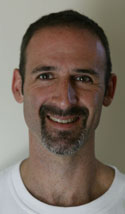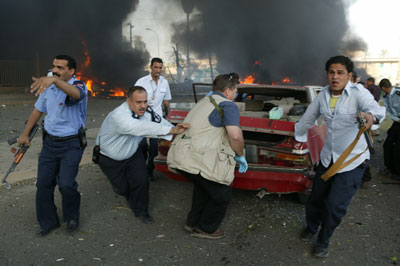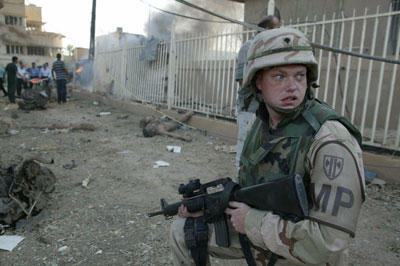 |
 |
One Emergency After Another: Normal for Baghdad
November 2003
|
 |
||||||||||||
|
Today is the first day of Ramadan, word on the street has it that things will be quiet for the next month, though Joao Silva, the other New York Times shooter, disagrees, and has warned me to be ready. At 8:15 A.M., I'm in the kitchen talking to reporter Dexter Filkins when the house shakes violently, a split second later comes the sound of the blast. The sound is still echoing in the room as Dexter and I sprint from the kitchen, trying to figure out how to get to the blast site. As I run to my room for my gear, I see Joao heading to the roof to get a fix on the plume of smoke. In a minute we're in the car with Jaff, our translator, roaring towards the city center. Walid, our driver, blasts the horn, climbs onto the sidewalk and cuts through intersections to get around the standstill traffic. Joao says the smoke is about a kilometer away, I can still feel the violence from the blast, and as I double check my ASA, my batteries and my flash cards, I keep thinking, "God help those that were close to it."
Vehicles are on fire around us, you can feel the heat from the flames. The area has that blasted look, like a great hand threw everything in the air and it landed in random broken heaps. Glass, chunks of concrete, power wires and smashed cars lay about. A handful of Iraqi police are bringing out the wounded, the first one a man covered in blood and motionless on a stretcher. The cops are screaming, waving guns and stumbling through the smoke. I run backwards in front of them, shooting wide with the fires burning in the background. As always in combat situations, I tell myself to stay calm, keep thinking -- check your focus, look behind you as you back up, concentrate on the composition, anticipate the moments. You can deal with your own emotions later. Across the street I see naked corpses scattered about, their clothes have been blown or burned off by the blast. A man is cut in half, his torso on fire. A long black trail leads to his body -- he must have been blown burning across the grass and I hope only that he never felt a thing. Another lays face down, wedged against a lamppost, blood flowing from his mouth. An Iraqi cop searches for a something to cover him with, finds a bit of torn white plastic and gently covers his body as one of the first Americans to arrive passes in the background. There are more explosions, are they gas tanks exploding nearby, bombs, mortars, I can't tell. I know this bomb is too violent to be a decoy, something to lure rescue forces into the area and then kill them with a secondary explosion. There are two guys helping to direct the rescue -- civilian clothes, English speakers, heavily armed with hi-tech radios and sunglasses, CIA or NSC, heavy hitters. They've got the look and attitude of trained killers.
The other civilian has an Australian accent and is sympathetic, "Show Al Jazeera this," he says. "This is the Red Cross," he tells me. "They bombed the Red Cross." Seems impossible. "Who would bomb the Red Cross?" I wonder. More U.S. troops begin to arrive and look terrified, you can almost see them shaking. They recoil from the bodies. I don't think they've seen anything like this before. I begin to focus on the Americans, knowing it's just a few minutes until we're put out of the area. Two MP's stand looking down at a corpse. A moment later another, I see a lone MP drop to one knee near a body laying awkwardly against a fence, the smoke rising in the background. I compose and shoot as the soldier looks back past me, eyes wide with fear - or maybe it's astonishment at what men do to one another. The MP's begin to push us back. A sergeant says sardonically, "You got your pictures, go sell them and make lots of money now." I have to restrain myself from grabbing him, screaming in his face, telling him about our dedication to documenting history, the risks photojournalists take year after year for very little money, about my friend Patrick, shot next to me in Liberia, about Jean Helene, killed a few weeks ago in the Ivory Coast, about Kurt and Miguel, about the friends Joao has lost. We could be making more money shooting portraits or corporate work. It's a complicated and ultimately fruitless conversation and instead I curse the soldier and we walk back down the street to the car and the dozens of late-arriving journalists fenced in behind a barricade.
We're out of the car moving toward the station. There's a strange stillness in the air. A man in a white robe runs towards me pushing me hard, trying to knock me down, he begins to shout, his face contorted with rage. To my right I see a crowd surging in on Joao and Dexter, Walid is arguing violently with the locals...more shouts fill the air, people running towards us, this isn't just one idiot. "Somalia," I'm thinking, "Dan Eldon," I look to the American tank 75 feet away, the gunner looks at me impassively. The man in the white robe is screaming in Arabic waving the crowd forward. (Walid tells us later the cry was, "Kill them, kill them all.") I retreat to the car, there's a blow to my head, a rock shoots past me, another, a hail of them come down, chunks of concrete. I can feel the pain throbbing now, my balance is off. Joao is pulling me into the car, screams and glass flying, the side windows shatter, more glass crashing behind me. Shards shower our face and arms. I can feel the warm blood finding its path through my hair, down my forehead, into my eyes. It's oddly comforting as the stones come it, stabilizes me in some way, "Ok, I'm bleeding now so that's done, don't have to worry about that any more…" One last look at the American soldier, he hasn't moved a muscle. Walid has the key in, he burns the tires in reverse, then cuts the wheel, throws it in first and burns rubber through the intersection. Me and Joao are hunched over trying to get as close to the floor as possible. A glimpse out the window, the crowd is huge, maybe 300 people, most of them bent on killing us. They're moving in on us, it looks like they're going to try to hold the car back with their hands, certainly possible with the numbers they've got. A teen stands squarely in front of the car with a huge rock, daring Walid to run him down. Walid's foot never lifts; an instant before we reach the man, he hurls the rock at Walid's head, then dives out of the way as it smashes the windshield.
At the hospital I'm embarrassed to be there with my little head wound when people are dying. They have me sit on a table that has wet blood all over it. The doctor's apologetic but they're really not equipped to clean the place and people are waiting, he explains, as he pulls the needle through my scalp. On the way back to the bureau we talk about the attack, what we could have done differently. The car should have been turned around, ready to go. Walid and Jaff, both licensed to carry weapons, left their guns at home in hurry to get out the door. Would warning shots in the air have provoked return fire from the crowd, would the Americans have mistaken us for terrorists and killed us? Impossible to know. Yet there is no doubt in anyone's mind of one fact; we came within moments of being beaten to death. Joao and I edit and send our takes. Foreign editor Cecilia Bohan calls later to say we did a good job. It's odd that after so much you wait to hear a few words of encouragement like this — that we did ok. Later Joao and I look at each other's pictures. He shot some amazing scenes that I did not see and vice versa, his two most powerful photos are very graphic and don't run, but he has one of a corpse burning in a car that they publish. We talk about the day; a rough one and it could have been worse, at least for us. But this violence, this war, this carnage is happening whether we shoot it or not. We're left with a certain grim realization: we've done what we came for, to bear witness.
© Michael Kamber
Polaris/New York Times
|
|||||||||||||
|
Write a Letter to the Editor
Join our Mailing List
© The Digital Journalist
|



